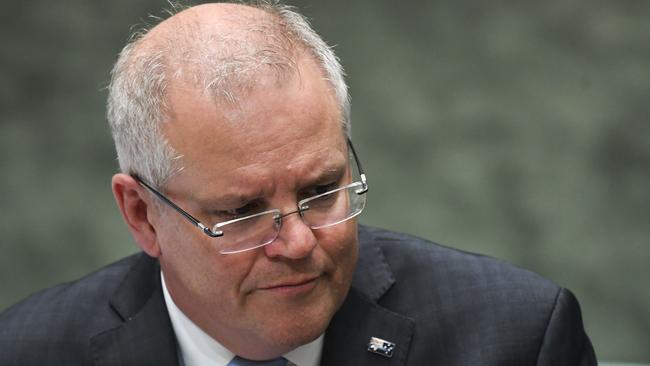PNG’s stinging critique of Australia’s aid management
PNG has blasted the federal government’s administration of $580m-per-year in development assistance as COVID-19 hits Pacific communities.

Australia’s biggest aid recipient, Papua New Guinea, has blasted the federal government’s administration of $580m a year in development assistance, ahead of an anticipated humanitarian crisis as COVID-19 hits vulnerable Pacific communities.
Days after Scott Morrison declared his Pacific step-up more important than ever, PNG’s High Commissioner to Australia John Kali warned a lack of engagement with local officials was threatening the effectiveness of Australian support.
In a blogpost for the ANU’s Development Policy Centre, Mr Kali said he was “saddened” that previously good co-operation between Australian and PNG officials had given way to “frustration, confusion and a loss of effective and transparent engagement”.
“A significant degree of strategic planning and programming and decision making for resourcing is taking place outside of our government circles, sadly without justification for the expenditure,” the High Commissioner said.
“PNG managers and leaders have been left out. There has been a significant decrease in the use of PNG government systems, procedures and processes.”
Mr Kali said Australia’s Department of Foreign Affairs and Trade had failed to take account of PNG priorities, branding a key governance program as “mere window dressing”.
He said fixing the program would require Australia and PNG to work together as “equal partners” in designing and delivering support.
The stinging critique comes as Australia scrambles to reshape the aid program to help key Indo-Pacific partners to respond to the coronavirus pandemic.
Opposition international development spokesman Pat Conroy said the High Commissioner’s comments were an indictment on the Morrison government’s management of its Pacific relationships.
He said if Australia failed to work closely with Pacific nations to respond to the coronavirus, it would lose influence in the region to China.
“If Australia does not truly step up, other nations will become the partner of choice for the Pacific with dire strategic and humanitarian implications,” Mr Conroy said.
“Rather than cutting Pacific health aid by 10 per cent and investing in Australian based consultants … the government must allocate aid to where it will help Papua New Guinea and other Pacific nations get through the twin health and economic crises caused by COVID-19.”
Pacific nations – some of them also suffering the impact of Tropical Cyclone Harold – have so far recorded more than 220 COVID-19 cases.
There fears the crisis will escalate in the region, where stretched health systems and underperforming economies could be overwhelmed.
Australia’s COVID-19 support to the Pacific so far includes working with regional governments to establish quarantine facilities, provide virus testing, and put in place protocols to ensure the clearance of flights carrying food and medical supplies.
Australian officials are also preparing to work with international lenders on post-pandemic support, with a focus on infrastructure and employment programs.
International Development Minister Alex Hawke, who was already reviewing the aid program, recently defended Australia’s contribution to the regional response, amid Chinese donations of cash and medical equipment.
Without naming China, which has been accused of providing substandard equipment to developing countries, he said Australia’s response might be slower but it was more effective.
“We'd make the point, of course, that every country's got a responsibility to make sure that the equipment they're sending is in good order, that it works, that it doesn't add to the burdens in-country,” he told the ABC’s Pacific Beat.
“And it's why in a country like Australia, we take a very careful approach. It does take a little bit longer, but we do make sure, when we respond, it's a high-quality response. The equipment we send will be in top order, that it will work and that it will be very effective.”
PNG Prime Minister James Marape, who secured a $442m loan from the Morrison government last year, has previously argued for Australia to provide aid to his country through direct budget support.
His country, which is facing a financial and budget crisis, was negotiating a $3.3bn bailout package with international lenders before the pandemic hit.




To join the conversation, please log in. Don't have an account? Register
Join the conversation, you are commenting as Logout